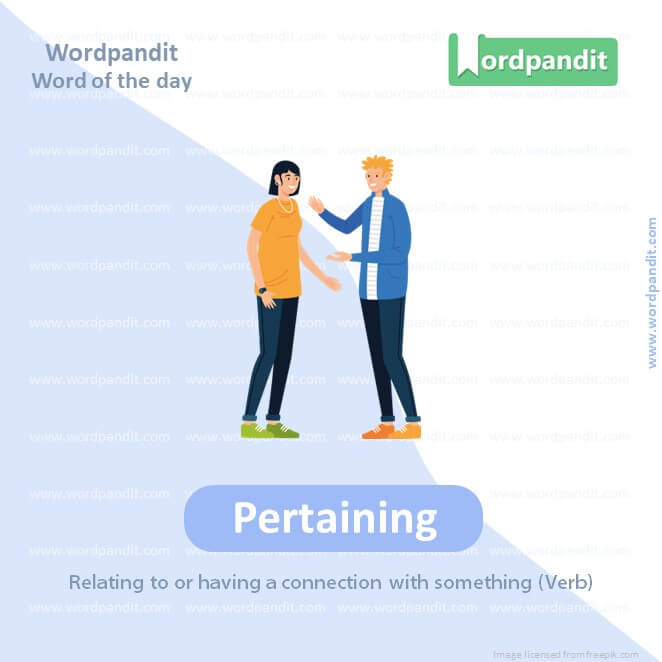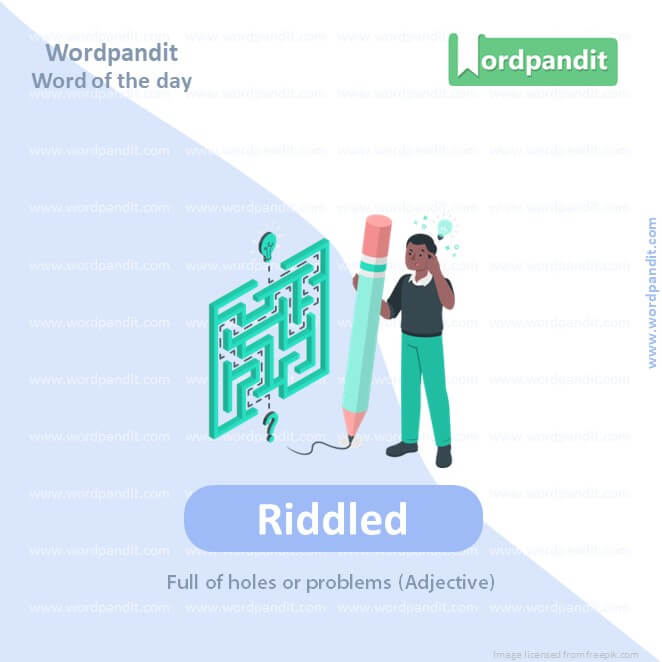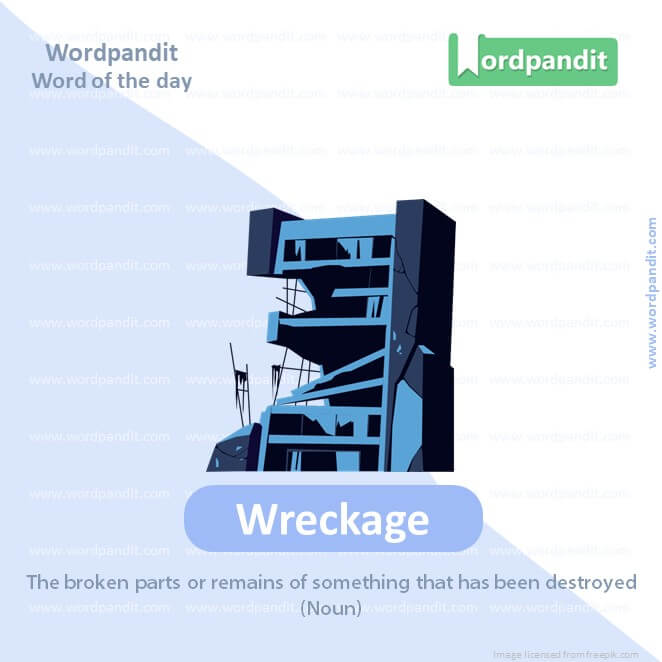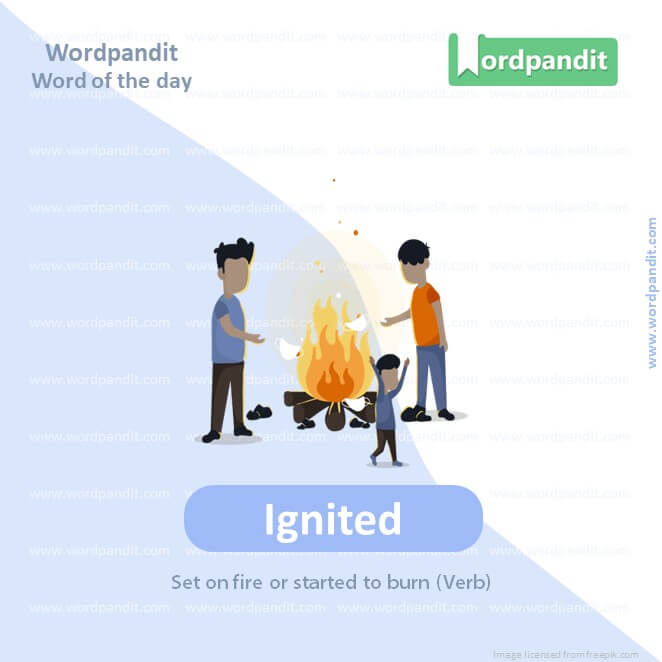Daily Vocabulary Words: List of Daily Used Words in Leading Indian Newspapers
Hi there. Welcome to this special section @ Wordpandit. Our endeavour here is straightforward: highlighting daily vocabulary words that you would come across in leading newspapers in the country. We have included the following newspapers in our selection:
• The Times of India
• The Economic Times
• Hindustan Times
• Mint
• Indian Express
We are putting in extensive work to develop your vocabulary. All you have to do is be regular with this section and check out this post daily. This is your repository of commonly used words; essentially, we are posting a list of daily used words. Hence, this has significant practical application as it teaches you words that are commonly used in leading publications mentioned above.
Visit the website daily to learn words from leading Indian newspapers.
WORD-1: Drenched
CONTEXT: California was drenched by a strong storm on Thursday, which caused widespread damage across the state.
SOURCE: [Source not provided]
EXPLANATORY PARAGRAPH: Imagine standing in the rain without an umbrella, and your clothes get completely wet. When something is drenched, it means it’s soaked or filled with water, like a sponge when you dip it in a bucket.
MEANING: Soaked or filled with water, often referring to clothes or objects (Adjective).
PRONUNCIATION: DRENCHT
SYNONYMS: Saturated, Soaked, Sopping, Wet, Waterlogged, Damp, Moist.
USAGE EXAMPLES:
1. The kids were drenched after playing in the sprinklers.
2. Caught in the sudden downpour, their clothes were drenched.
3. The sponge became drenched with water as it soaked up the spill.
4. The drenched umbrella dripped water on the floor.

WORD-2: Toxicology
CONTEXT: A tragic incident that left three Kansas City Chiefs fans dead from hypothermia last month has taken a new twist, as Fox 4 KC reported that illegal drugs were detected in their toxicology reports.
SOURCE: [Source not provided]
EXPLANATORY PARAGRAPH: Think about how a doctor checks if medicine is good for you. Toxicology is like that, but for everything, studying what things are harmful or poisonous to people, animals, or even plants.
MEANING: The study of poisons and harmful substances and their effects on living things (Noun).
PRONUNCIATION: tok-si-KOL-uh-jee
SYNONYMS: Poison ology, Toxin Study, Poison Analysis.
USAGE EXAMPLES:
1. The scientist specialized in toxicology, researching harmful chemicals.
2. The field of toxicology helps us understand the dangers of certain substances.
3. The doctor consulted the toxicology report to identify the cause of illness.
4. Studying toxicology is essential for ensuring the safety of new products.

WORD-3: Pertaining
CONTEXT: It reported that this was the only sentence remaining from the document pertaining to India as the rest was redacted.
SOURCE: [Source not provided]
EXPLANATORY PARAGRAPH: Imagine a story that only talks about one adventure. When something is pertaining, it means it’s related to or talking about a specific thing, like reading a book that’s all about dinosaurs.
MEANING: Relating to or having a connection with something (Verb).
PRONUNCIATION: per-TEY-ning
SYNONYMS: Relating, Concerning, Regarding, Appertaining, Connecting, Referencing, In connection with.
USAGE EXAMPLES:
1. The rules pertaining to the contest were clearly explained.
2. The document contains information pertaining to safety regulations.
3. The chapter in the book is pertaining to the history of ancient civilizations.
4. The discussion was focused on matters pertaining to environmental conservation.

WORD-4: Riddled
CONTEXT: A car parked at the residence as well as the home were riddled with bullets.
SOURCE: [Source not provided]
EXPLANATORY PARAGRAPH: Imagine a paper with lots of tiny holes in it. When something is riddled, it means it’s full of small holes or problems, like a sieve letting water pass through.
MEANING: Full of holes or problems (Adjective).
PRONUNCIATION: RID-uhld
SYNONYMS: Perforated, Hole-ridden, Infested, Pocked, Filled with, Infected, Laden with.
USAGE EXAMPLES:
1. The old wooden door was riddled with termite holes.
2. His argument was riddled with logical errors.
3. The report was riddled with inaccuracies and inconsistencies.
4. The fabric was riddled with moth-eaten patches.
WORD-5: Issuance
CONTEXT: India suspended visas issuance to Canadians right after Trudeau’s statement but that was restored in November.
SOURCE: [Source not provided]
EXPLANATORY PARAGRAPH: Think about when your teacher gives you a paper or a ticket. Issuance is like that – it’s when something official, like a document or permission, is given or provided to you.
MEANING: The act of officially giving or providing something, like a document or permission (Noun).
PRONUNCIATION: ISH-oo-uhns
SYNONYMS: Distribution, Release, Dispensation, Delivery, Allocation, Granting, Issuing.
USAGE EXAMPLES:
1. The issuance of passports is handled by the government office.
2. The company announced the issuance of new shares to investors.
3. The teacher oversaw the issuance of exam papers to the students.
4. The issuance of licenses is subject to certain conditions.
WORD-6: Engulfing
CONTEXT: The footage showed a thick cloud of white smoke rising from the wreckage and the flames engulfing the trailers.
SOURCE: [Source not provided]
EXPLANATORY PARAGRAPH: Imagine a big wave at the beach covering everything in its path. When something is engulfing, it means it’s surrounding or swallowing up something, like a giant hug that covers you completely.
MEANING: Surrounding or swallowing up something, often in a powerful or overwhelming way (Adjective).
PRONUNCIATION: en-GUHL-fing
SYNONYMS: Swallowing, Submerging, Overwhelming, Consuming, Enveloping, Devouring, Immersing.
USAGE EXAMPLES:
1. The fire was quickly engulfing the entire building.
2. The news of the scandal was engulfing the headlines.
3. The feeling of love was engulfing her heart.
4. The darkness was engulfing the forest as the sun set.

WORD-7: Wreckage
CONTEXT: The footage showed a thick cloud of white smoke rising from the wreckage and the flames engulfing the trailers.
SOURCE: [Source not provided]
EXPLANATORY PARAGRAPH: Imagine a toy car that got smashed and is now in pieces. When something is wreckage, it means it’s the broken parts of something that used to be whole, like a puzzle missing some pieces.
MEANING: The broken parts or remains of something that has been destroyed (Noun).
PRONUNCIATION: REK-ij
SYNONYMS: Debris, Ruins, Remains, Rubble, Shambles, Ruination, Fragmentation.
USAGE EXAMPLES:
1. The firefighters sifted through the wreckage of the burned house.
2. The airplane wreckage was scattered across the field.
3. The storm left a trail of wreckage in its wake.
4. The archaeologists carefully examined the ancient shipwreck’s wreckage.
WORD-8: Clandestinely
CONTEXT: We know that the PRC sought to clandestinely and deceptively influence the 2019 and 2021 federal elections.
SOURCE: [Source not provided]
EXPLANATORY PARAGRAPH: Imagine a game where you hide and no one can see you. When something is clandestinely, it means it’s done secretly, like whispering a surprise plan to a friend without anyone else hearing.
MEANING: Done secretly or in a hidden manner (Adverb).
PRONUNCIATION: klan-DES-tin-lee
SYNONYMS: Covertly, Stealthily, Secretly, Furtively, Privately, Surreptitiously, Unobserved Ly.
USAGE EXAMPLES:
1. The spies operated clandestinely to gather information.
2. They met clandestinely in the quiet corner of the park.
3. The treasure was clandestinely hidden in a remote cave.
4. The students exchanged notes clandestinely during the exam.

WORD-9: Ignited
CONTEXT: The impact was so violent that the plane smashed into one trailer and ignited three others, creating a huge blaze that could be seen from miles away.
SOURCE: [Source not provided]
EXPLANATORY PARAGRAPH: Picture a match lighting up a candle. When something is ignited, it means it’s set on fire or starts to burn, like when you light a piece of paper with a match.
MEANING: Set on fire or started to burn (Verb).
PRONUNCIATION: ig-NYT-ed
SYNONYMS: Lit, Kindled, Inflamed, Enflamed, Fired, Sparked, Flared up.
USAGE EXAMPLES:
1. The dry leaves ignited quickly when exposed to the flame.
2. The spark ignited the gas, creating a small explosion.
3. The fireworks ignited, filling the sky with colors.
4. The campfire was ignited using dry twigs and leaves.
WORD-10: Extinguished
CONTEXT: The fire was quickly contained and extinguished, and no other injuries or fatalities were reported among the residents of the mobile home park.
SOURCE: [Source not provided]
EXPLANATORY PARAGRAPH: Imagine blowing on a birthday candle to put it out. When something is extinguished, it means it’s put out, like turning off a lamp before bedtime.
MEANING: Put out or stopped from burning (Verb).
PRONUNCIATION: ik-STING-gwishd
SYNONYMS: Quenched, Smothered, Snuffed out, Doused, Suppressed, Extinguished, Squelched.
USAGE EXAMPLES:
1. The firefighter quickly extinguished the small blaze.
2. Using the fire extinguisher, they successfully extinguished the kitchen fire.
3. The wind threatened to extinguish the candle, but she protected it with her hand.
4. Efforts to control the forest fire were challenging, but eventually, it was extinguished.
Vocabulary Meaning
In the ocean of language learning, ‘vocabulary meaning’ is akin to the colorful coral reefs that add depth and vibrancy to communication. Yet, infusing our interactions with this vibrancy is often a challenge for many language learners. The crux lies in effectively deciphering and employing the ‘vocabulary meaning’.
Learning ‘vocabulary meaning’ isn’t about merely gluing words to their definitions. It’s about forming a deep understanding and connection with these words that transcends rote learning. To gain a comprehensive grasp of ‘vocabulary meaning’, one needs to navigate beyond textbook definitions and commit to exploiting diversified resources such as novels, films, music, articles, and digital content. This allows one to encounter vocabulary in a variety of contexts and actual usage, giving deeper insight into their meaning.
However, understanding ‘vocabulary meaning’ involves another essential aspect—memory retention. Techniques such as spaced repetition and the Leitner System offer effective methodologies to maintain and consolidate the ‘vocabulary meaning’. Additionally, leveraging mnemonic strategies can help etch words into your memory by linking them with unique stories or imagery that are personal and easily recallable.
Another way of mastering ‘vocabulary meaning’ is by immersing yourself in the language. Engage in regular conversations with native speakers if possible or utilize language exchange platforms to practice your skills. This not only bolsters your understanding of how the vocabulary is used but also helps articulate the ‘vocabulary meaning’ in the societal and cultural contexts.
In conclusion, gaining a robust grasp of ‘vocabulary meaning’ is a journey rather than an end goal. It requires dedication, perseverance and most importantly, a multi-faceted approach that includes diversified resources, effective memory strategies, and real-life application. With these strategies in place, the depths of ‘vocabulary meaning’ are no longer daunting but become an enchanting exploration of language.













